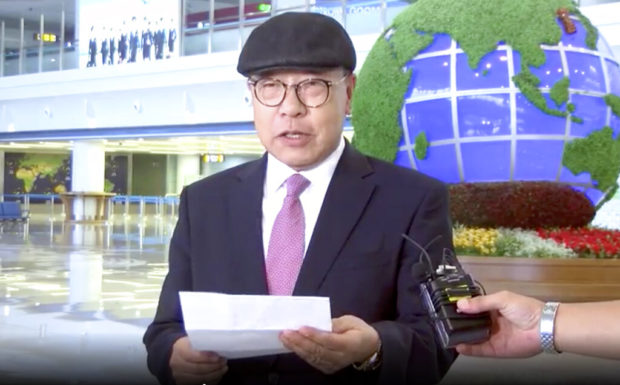Son of prominent South Korean defector moves to North Korea

In this image made from video taken on July 6, 2019, by North Korean Uriminzokkiri state-run website, shows the son of the highest-profile South Korean ever to defect to North Korea, Choe In-guk giving a statement to media as he arrived in the North to permanently resettle. AP
SEOUL, South Korea — The son of the highest-profile South Korean to defect to North Korea has arrived in the North to permanently resettle, North Korean state media said. If confirmed, it would be an unusual case of a South Korean defecting to the impoverished, authoritarian North.
The state-run Uriminzokkiri website reported that Choe In-guk, about 72, arrived in Pyongyang, North Korea’s capital, on Saturday to dedicate the rest of his life to Korean unification at the guidance of leader Kim Jong Un. The website published photos and a video showing a bespectacled Choe in a beret reading his arrival statement at Pyongyang’s airport.
Choe said he decided to live in North Korea for good because it was his parents’ “dying wishes” for him to “follow” North Korea and work for its unification with South Korea, according to a written statement published on the website.
Choe is the son of former South Korean Foreign Minister Choe Dok-shin, who defected to North Korea with his wife in 1986, years after he was reportedly embroiled in a corruption scandal and political disputes with then-South Korean President Park Chung-hee. He died in 1989.
Some analysts say North Korea accepted Choe In-guk so it could use him as a propaganda tool to tell its citizens its system is superior to South Korea’s. North Korea is struggling to revive its moribund economy and improve people’s livelihoods, since the United States has not agreed on major sanctions relief until it takes significant steps toward nuclear disarmament.
Article continues after this advertisementSouth Korea’s Unification Ministry said Choe In-guk was in North Korea without special permission from the Seoul government to visit the North. Ministry spokesman Lee Sang-min told reporters Monday that authorities were trying to determine details about Choe’s travel to North Korea.
Article continues after this advertisementThe two Koreas, split along the world’s most heavily fortified border for about 70 years, bar their citizens from visiting each other’s territory and exchanging phone calls, letters or emails without special permission. Under a South Korean security law, people who secretly visit North Korea can face up to 10 years in prison.
Since the end of the 1950-53 Korean War, more than 30,000 North Koreans have fled to South Korea to avoid political repression and economic poverty. South Koreans have occasionally defected to North Korea in the past, but it has become a rarity in recent years, especially since the North suffered a crippling famine in the mid-1990s that is estimated to have killed hundreds of thousands of people.
A small number of South Koreans suffering economic hardship at home have gone to North Korea to live in past years, but North Korea is known to have repatriated such people. The Unification Ministry said North Korea returned two South Koreans who entered North Korea last year, but it didn’t elaborate.
Before his 1986 defection to North Korea, the senior Choe had lived in the United States for about a decade and was a vocal critic of Park, who ruled South Korea with an iron fist from 1961 to 1979. He was previously Park’s foreign minister and ambassador in West Germany.
In North Korea, he was made vice chairman of the Committee for the Peaceful Reunification of the Fatherland, which deals with relations with South Korea, and chairman of the Central Committee of the Chondoist Chongu Party, a political group affiliated with a Korean native religion called “Chondo.” He once headed the Chodo church in South Korea.
His wife, Ryu Mi Yong, also took a series of high-profile jobs, including membership in the presidium of the North’s rubber-stamp parliament and chairwoman of the Central Committee of the Chondoist Chongu Party. When she died at the age of 95 in 2016, a public funeral was organized and her body was buried along with her husband’s at Pyongyang’s Patriotic Martyrs’ Cemetery.
According to South Korea’s Unification Ministry, Choe In-guk was allowed to make 12 authorized trips to North Korea since 2001 for events such as visiting his parents’ cemetery and attending a death anniversary for his mother.
It wasn’t immediately known how he went to North Korea, but South Korean media speculated he flew from Beijing with a North Korean government-issued visa.
Choe was a member of the Chondo church in South Korea and worked for a church-affiliated organization focusing on inter-Korean engagement, according to church official Na Han Yub, who said met Choe once or twice a year.
Na said Choe rarely talked about his personal life and didn’t participate much in church activities. Na said he didn’t know what motivated Choe to go to North Korea but could confirm that he is the person shown in North Korean state media photos. /ee